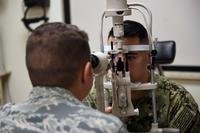So that the truth may set you free, or at least help your claim along.
Last week we talked about the “Not Surprise” factor of VA foibles. This time, we’ll see how to communicate safely with the VA National Call Center.
In another article, I talked about the idea of “Not Surprise,” including a little satire about Lindsay Lohan and some other comments that I try to avoid making on this blog. But for context, here’s a little PG quote:
What I’m about to say may shock you. And I don’t mean like the first time Lindsay Lohan was arrested, “Lohan arrested for a DUI,” circa 2007. Or even like, “Lohan, probation revoked,” type of shock you, circa 2010. It’s more like, “Lohan on house arrest and charged with stalking her ex-girlfriend,” kind of shock you, circa 2011. (My 9 year old even saw that one coming.)
Coincidently, Lohan was back in the press just two days after I published that. The title on Drudge? “Cuffed Again.” Was anyone surprised? No. In fact, the world yawned.
VA’s Reputation
When someone has a reputation, good or bad, it is usually earned. Here, I assert this is also true with the VA. Behind the scenes, the VA has worked hard to have a reputation, in my mind. And that reputation is not one that is clearly benevolent. In the legal universe, it’s more of the opinion you have of a bratty kid who ignores the rules everyone else has to abide by.
Last week, I quoted the Supreme Court’s tongue lashing of the Board of Veterans Appeals for rendering decisions that were “substantially unjustified,” from 2010. Just two months ago, VA officials made a decision to ignore the law relating to how they are required to help veterans with their claims. According to the a recent law suit on the matter, the VA doesn’t believe it needs to “fully explain the issues” or help veterans know what evidence to submit, ignoring the case law of the Bryant Decision and 38 CFR Part 3.103. Yes, the VA has decided their Board of Appeals can ignore the US Court of Appeals; veterans and the law be damned.
VA National Call Center
Knowing this, you need to be especially careful when speaking with the people who work at the VA National Call Center, (who you talk to when you call 800-827-1000), a much lower level professional than even the Board Adjudicators. We’ll just call it the VNCC here out.
As it relates to communication between you and the VNCC, there are two questions that you must ask at the beginning of every call:
- What is your name?
- Can you please give me a reference number for this call?
Take every “fact” they tell you about your claim with a grain of salt, especially if it is contradictory to what your Veteran Service Officer or attorney told you. Take notes during the call. You may even be able to record the call if that’s legal in your state.
During my last call with the VNCC, I was told I couldn’t request an informal DRO hearing. Meanwhile, Part 3.103 clearly states I can. “Upon request, a claimant is entitled to a hearing at any time on any issue involved in a claim…” I placed the request 18 months before, a VA Regional Office counselor filled out the request, and my VSO told me to expect a letter in the mail scheduling the hearing. Meanwhile, I have some joker in Arizona telling me I cannot request a hearing. Who do I believe? Clearly not the guy on the phone.
Shock of "Not Surprise"
Was I surprised? No. Again, this was a firm case of Lindsay Lohan “Not Surprise.” I previously read the book “Vets Under Siege.” (I suggest all of you feel I pick on the VA too much to read the facts, and especially the facts reported in this book.) You can also read the statistics below in his article on the same subject, appropriately titled, “The VA should be ashamed.”
The VA has twice done a Mystery Shopper type study of their own call center. They found that “22 percent of the callers received information that was judged ‘completely incorrect.’” Another 34 percent received “minimally correct” information. Only 10 percent of the calls received “mostly correct” information. And even that was deemed to be not entirely accurate. This is according to the VA about the VA. For those of you who hate it when I rag on the VA, don’t shoot the messenger. Point the finger at your own organization.
In my own situation, I called my VSO. Jack pointed to the same rule I cited above (3.103), and said the operator was just flat wrong. On top of that, “Michael” was very rude and constantly interrupted me.
This of course ceased once I identified that I am a second year law student and that I therefore understand how the law works. I further asked for his name and a call reference number which totally changed the tone of his voice. It’s amazing what happens when you let them know there may be an accounting for their misdeeds at a later date.
And was my VSO right? Of course he was. Literally 3 days later, I received a letter scheduling my informal hearing with the Decision Review Officer, as I had hoped. After waiting 18 months for the appointment, you can imagine my impulse to just scream at the guy on the other end of the line, but I didn’t.
You call center assignment
Here’s your take away, like it take it, hate it leave it:
- Always get the name of the operator.
- Never take what they say as the god’s honest truth.
- Double-check with your Veteran Service Officer everything you were told. This is especially true if you were told you needed to do something.
- Keep your cool.
Now, I have also received some great help from the people at the call center. Overall, I don’t believe they are trained well, which is unfortunate since veterans deserve the best.
After all, without the military might we’ve exercised over the past 100 years, our country would not be as prosperous as it has been. Maybe some of those tax subsidies should be kicked over to the call center’s training fund. Because right now, what is going on is not acceptable. It’s like entrusting a lawnmower mechanic with overhauling the engine of your car. Can they do it? Maybe. Should they do it? Hell no.



